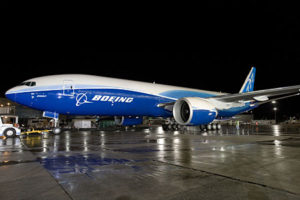Boeing Co., in cooperation with Air China Ltd. and others, plans to test a commercial-jet biofuel in China produced from a locally grown plant by the middle of 2011-part of an effort to commercialize cleaner fuels world-wide and bolster China’s potential as a biofuel provider.
Boeing first tested a biofuel on a Virgin Atlantic Boeing 747 jet in early 2008 in London. It has since conducted similar tests a few more times, each time experimenting with different types of biofuels on different engines. The China demonstration flight, expected to be conducted by May or June next year, would be Boeing’s sixth such demonstration flight using a biofuel, said a Boeing executive, Al Bryant, in an interview Monday with The Wall Street Journal.
The biofuel to be used in the scheduled test flight is one based on jatropha, a thorny wild green shrub that grows well on a wide range of terrains in hot climates such as Latin America and Africa. It is expected to be supplied by Chinese oil company PetroChina Co., which grows jatropha in southern China for aviation use, said Bryant, vice president of research and technology at Boeing’s China operations.
“It’s harvested here and processed here, and we test it with an airplane operated by a Chinese airline and is going to be flown here in China,” the executive said. “This flight is going to demonstrate that China has the ability to create a new biofuel industry here in China.”
[ad]
Analysts say development of biofuels based on feedstocks such as jatropha looks promising, but commercial mass production, as well as getting regulatory approvals for the new jet fuel, still will likely take several years, if not more. Boeing argues the prohibitively expensive cost will come down.
Some pessimists also had pointed out that biofuel would freeze before a jetliner reached cruising altitude, or that it would require punishingly costly modifications to the aircraft engines to make it work.
Boeing says its two years of demonstration flights counter those claims. By injecting similar additives used in petroleum-based fuel, the freezing point of biofuels has been rendered a nonissue, and engine modifications have proven unnecessary, Boeing says.
“We’re focused on plant-based sustainable ‘drop-in’ biofuels so that you can fly to Chengdu, fill up with a biofuel, and fly to Australia somewhere and fill up with a petroleum-based fuel, and you don’t have to clean the tank or drain it or anything,” Bryant said, referring to a major city in southwest China. “No modifications to the airplane engines would be necessary. It is a drop-in solution.”
Moreover, with fears that the days of petroleum are numbered, the global aviation industry is more inclined to pursue long-term diversification of its raw materials. Breakthroughs have also come more quickly than people anticipated.
“If we can do that 1 8 commercialize biofuels for aviation 3 8 , that gives our customers an alternative supply of fuel, and hopefully we could smooth out some of the spikes in jet fuel prices and allow airline operators to be more financially stable,” Bryant said.
Boeing envisions a future, he said, where the entire global aviation industry would be supplied with plant-based biofuels that don’t compete with food for land and water, so that a rapid adoption of biofuels by the aviation industry doesn’t drive up food prices. That future could come as early as 2025, Bryant said.
To realize that vision, Bryant said the industry needs to make a lot of technological breakthroughs. But one secret weapon, he said, is biofuels based on algae, which have higher levels of energy density. Boeing is conducting some of its research-and-development efforts in China in part because the country, Bryant said, has done some “leading-edge” research in the field.
To accelerate the research and development of such algae-based aviation biofuels, Boeing earlier this year opened a joint research laboratory in Qingdao with a Chinese government research institute and is looking at expanding the effort to other labs.
“You can serve the entire aviation industry’s fuel needs by planting soybeans in an area the size of continental Europe. Or you could plant algae and get the same impact in an area the size of the country of Belgium,” Bryant said.
Source chicagobreakingbusiness.com


